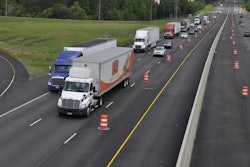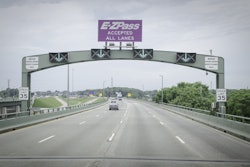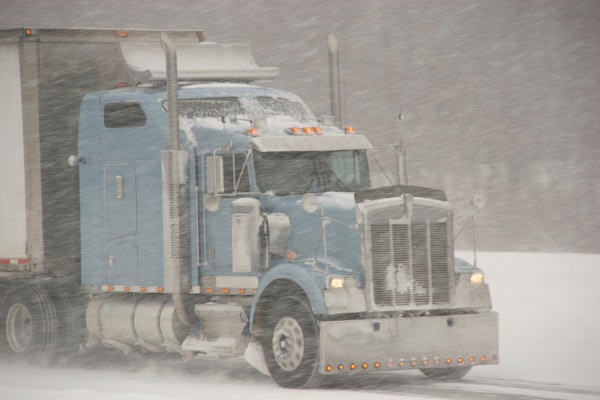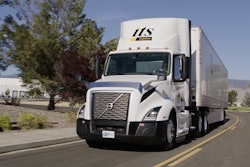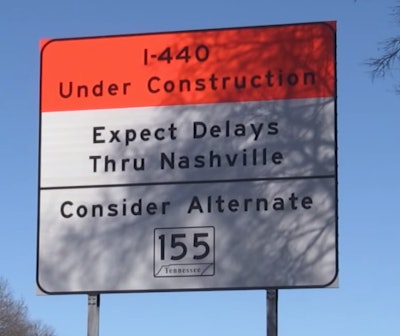
Would a standardized miles-traveled tax for all highway users be a good alternative to today’s fuel-tax system?
Poll results above were collected in the wake of Overdrive Editorial Director Max Heine’s post to the Overdrive Extra blog detailing moves around the nation to explore the idea of a vehicle-miles-traveled tax as a replacement for the motor fuels tax that drives highway infrastructure financing today. Part of the picture complicating the very notion of replacing the fuel tax is the slow but steady overlay of toll roads on top of the current system, which so many view as tantamount to double taxation. As Heine wrote in that piece, “Tolling interstates is another seasoned punching bag” in the trucking/highways conversation, “but some of the old arguments against it are beginning to soften.”
Softening, that is, as long as we’re talking about the notion of applying a miles-traveled tax in a consistent and equitable fashion. “By ‘all highway users,’ I guess they really mean all, including cars,” noted Overdrive reader Richard in commentary under the poll. Not that the reader was necessarily among the rough third (37%) in favor of a VMT tax as a potential alternative to the today’s fuels tax system. As always, he suspected, “the truck will pay more taxes on that also, as they do now. Any amount of money will never be enough.”

Reader Don took that further, likening the imposition of a VMT tax to what happens with toll roads today: “I think you would get hit twice because your still going to pay tax at the pump. They wont get rid of that. They will probably increase it.”
Government mismanagement of funding, others suggested, was likely to continue to plague the system, however it’s funded. As Bob West put it, “It’s not going to matter how they charge. They will still mismanage the money.”
Yet the last time Overdrive polled readers about the appropriateness of allowing toll projects on the interstate system, two thirds objected to it categorically, while the vast majority of the rest preferred limiting any tolls to new lanes or new roads entirely. A VMT tax as a replacement for the fuels tax garners wider support, though its often-envisioned method of collection and accounting for miles — widespread in-vehicle telematics — is also viewed by some to have “obvious privacy implications,” as noted reader M.J. Nichols, as does any personal electronic device from which information is pulsed, collected and harvested, whatever the reason for the harvesting.
The predominance of fuel surcharges, too, makes it at least relatively simple to “recover a fuel tax increase,” Nichols added, given such increases would rather automatically reflect themselves in carriers’ surcharge arrangements with customers. A VMT-tax increase might not be so easy to account for. “You’re going to eat the VMT,” Nichols wrote.
The need for robust maintenance and new capacity, at least, is a given when one considers the state of the highway system today. The debate over the funding mechanism is complicated, for sure, though well-distilled by Heine in his prior post, wherever you stand on the potential for VMT taxing to replace the fuel tax. Read more via this link.
More voices, via Overdrive‘s Facebook page:
John Allen: A mileage tax that has to be paid each year based on how many miles traveled would shock people into holding their representatives accountable when they see how much they are actually paying in tax each year. Fuel tax is a hidden tax. People don’t realize how much tax they are paying when it is included in the price. At a minimum it should be separated from the price and added to the end like a sales tax, so people see how much they are paying in tax. If they realized they are paying between 50 cents and a $1 a gallon depending on the state, maybe people would demand the government be responsible with their money.
John Seaberg: They will never take the fuel tax off per gallon. They will just add on.
Brian Hiatt: If you don’t use the money for what it was saved for, you will never have enough.
Mike Donohue: How about a highway use tax for small vehicles like a big truck’s 2290 ? $50 for cars, $75 for pickups and electric/hybrids?
Via OverdriveOnline.com
“Rek Curt”: Long story short is that taxes have not kept up with inflation. Even at the federal level, what has every president done since Reagan’s era? They all cut taxes. As working people, we all relish in tax-cutting. But guess what, we will all need Social Security one day along with Medicare, and that is the program that has been robbed from and currently has the cross-hairs aimed straight at it. It is a matter of careful what you wish for!
Richard Davis: Do shippers pay any kind of tax? What about putting some kind of tax on the freight? Some kind of mileage rate. I know what people will say. ‘They will then ship it by rail.’ If so, why aren’t they doing it now? It shouldn’t just be the trucking industry that foots the highway cost.

